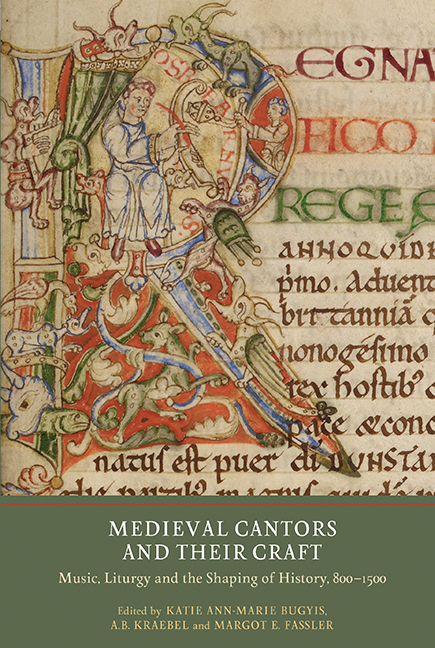Book contents
- Frontmatter
- Dedication
- Contents
- List of Illustrations
- Contributors
- Acknowledgments
- Abbreviations
- Miscellaneous Frontmatter
- Introduction
- PART I The Carolingian Period
- PART II The Eleventh Century
- PART III England in the Twelfth Century
- 9 Cantor, Sacrist or Prior? The Provision of Books in Anglo-Norman England
- 10 Symeon of Durham as Cantor and Historian at Durham Cathedral Priory, c. 1090–1129
- 11 Reshaping History in the Cult of Æbbe of Coldingham
- 12 William of Malmesbury as a Cantor-Historian
- 13 Lex orandi, lex scribendi? The Role of Historiography in the Liturgical Life of William of Malmesbury
- 14 Of the Making of Little Books: The Minor Works of William of Newburgh
- PART IV On the Continent: Five Case Studies
- Index of Manuscripts
- General Index
- Miscellaneous Endmatter
13 - Lex orandi, lex scribendi? The Role of Historiography in the Liturgical Life of William of Malmesbury
from PART III - England in the Twelfth Century
Published online by Cambridge University Press: 25 October 2017
- Frontmatter
- Dedication
- Contents
- List of Illustrations
- Contributors
- Acknowledgments
- Abbreviations
- Miscellaneous Frontmatter
- Introduction
- PART I The Carolingian Period
- PART II The Eleventh Century
- PART III England in the Twelfth Century
- 9 Cantor, Sacrist or Prior? The Provision of Books in Anglo-Norman England
- 10 Symeon of Durham as Cantor and Historian at Durham Cathedral Priory, c. 1090–1129
- 11 Reshaping History in the Cult of Æbbe of Coldingham
- 12 William of Malmesbury as a Cantor-Historian
- 13 Lex orandi, lex scribendi? The Role of Historiography in the Liturgical Life of William of Malmesbury
- 14 Of the Making of Little Books: The Minor Works of William of Newburgh
- PART IV On the Continent: Five Case Studies
- Index of Manuscripts
- General Index
- Miscellaneous Endmatter
Summary
In the late 1130s, the Augustinian canon Robert of Cricklade found cause to underscore his credentials as a reader of monastic works of devotion.
Nam et que in manus nostras venerunt scripta venerabilis abbatis Clarisvallensis legi; et viri summe eruditionis Guillelmi Meldunensis ecclesie monachi et cantoris preclarum opus quod super Lamentationes Ieremie compilavit non tantum legi, verum ut et in nostra ecclesia scriptum haberetur exegi.
[I have read whatever writings of the venerable abbot of Clairvaux that has come into my hands; and the brilliant work that the man of supreme learning, William, monk and cantor of Malmesbury, compiled on the Lamentations of Jeremiah I not only read, but even caused to be copied for our church.]
Robert goes on to praise William's miracles of the Virgin and his florilegium of Gregory the Great. This is, as far as I know, the only preserved reference to William of Malmesbury written in his own lifetime, and the focus and emphasis of Robert's portrayal offers a striking contrast to the prevailing image of William found in contemporary scholarship. Though in recent times William has been known and perceived mainly through his historical works, his monumental works on the deeds of the kings and bishops of the English are not even mentioned by Robert. Rather William the historian is overshadowed by William the cantor and monk, placed alongside no less a figure than Bernard of Clairvaux as a supreme exponent of monastic spirituality and devotion. The apparent tension between William the empirical, classicizing historian as we know him today and William the spiritual and liturgical master highlights the question I will address in what follows: to what extent did William's liturgical and other monastic practices and obligations influence, inform and direct his work as a historian and collector of classical literature? We know that William performed many of the tasks commonly associated with the office of cantor in this period, such as directing the library at Malmesbury. But what interests me is not the exact extent of his activities as cantor, but the extent to which these informed his historiographical works, that is to say, the extent to which the principles and aims inherent in the role of monachus et cantor are commensurate with the principles and aims of his writing of history.
- Type
- Chapter
- Information
- Medieval Cantors and their CraftMusic, Liturgy and the Shaping of History, 800-1500, pp. 240 - 254Publisher: Boydell & BrewerPrint publication year: 2017

